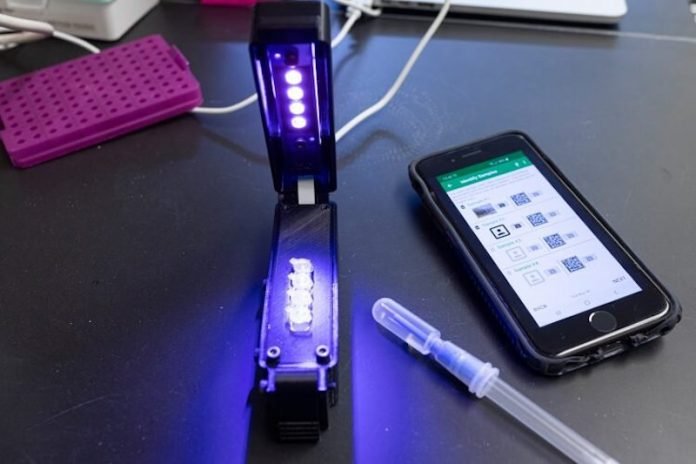
In a new study from the University of Washington, researchers have developed a new test for COVID-19 that combines the speed of over-the-counter antigen tests with the accuracy of PCR tests that are processed in medical labs and hospitals.
The Harmony COVID-19 test is a diagnostic test, that like PCR tests for COVID-19, detects genetic material from the SARS-CoV-2 virus.
But whereas conventional PCR tests can take several hours, the Harmony kit can provide results in less than 20 minutes for some samples and with similar accuracy.
The researchers developed Harmony to be simple and easy-to-use, employing ready-to-use reagents.
The test uses a “PCR-like” method to detect the presence of the SARS-CoV-2 RNA genome in a nasal swab sample with the aid of a small, low-cost detector, which was also designed by Lutz’s group.
A smartphone is used to operate the detector and read the results. The detector can handle up to four samples at a time and would fit into a standard car’s glove compartment.
The accuracy of COVID-19 tests has been a pressing matter throughout the pandemic.
Many at-home antigen kits for COVID-19, which detect pieces of the proteins the virus creates instead of its genetic material, are 80-85% accurate, though accuracy may drop with the Omicron variant, which harbors a relatively high number of mutations not found in other strains.
PCR tests are generally 95% accurate or better—a key FDA benchmark—but require expensive equipment and a long wait for results.
Initial results showed that the Harmony kit is 97% accurate for nasal swabs. The Harmony kit detects three different regions of the virus’s genome.
If a new variant has many mutations in one region, the new test can still detect the other two.
It can, for example, detect the Omicron variant, which has dozens of mutations in the region of the genome that encodes the so-called spike protein.
Though tests based on PCR—or polymerase chain reaction—are highly accurate, a key limitation is that PCR tests require dozens of cycles of heating and cooling to detect genetic material in a sample.
The test developed by the UW team sidesteps this issue by relying on a PCR-like method known as RT-LAMP, which doesn’t have the same stringent temperature-cycling requirements.
The team hopes the kits could be made available first for use in clinics, as well as other settings with medical oversight, such as workplaces and schools. Later, they would like to adapt the test for home use.
If you care about Covid, please read studies about the most effective face-mask practices to reduce spread of COVID-19, and what you need to know Omicron and COVID boosters.
For more information about health, please see recent studies about what should people do if their kids have COVID-19 symptoms, and results showing that in these places, you are most likely to get COVID-19.
The study is published in Science Advances. One author of the study is Barry Lutz.
Copyright © 2022 Knowridge Science Report. All rights reserved.




